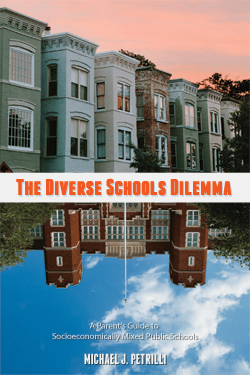 The Diverse Schools Dilemma is a well-reasoned exploration of the topics of education, race, and demographics. |
Mike did a great job with his new book, The Diverse Schools Dilemma.
I was raised in a close-in Boston suburb, at a time when Judge Arthur Garrity turned everything upside down with his forced busing order. J. Anthony Lukas helped make that dilemma of school integration personal through his Pulitzer-winning masterpiece, Common Ground. A generation later, Mike has made the story practical by walking the reader through his own hands-on exploration of what school integration really means for a parent seeking the best both for his child and his wider society.
I now have two kids of my own and live in the D.C. area, so my wife and I essentially went through much of what Mike and his wife did in trying to make a local school choice that could provide both diversity and top-quality education. We, in fact, looked at some of the very same schools and came to some similar conclusions. Our mutual assessment appears to be, “It's not easy, and you probably can't have it all.” That said, there's quite a lot that Mike helps the reader consider—from using hard data on school performance and economics, as well as his policy expertise—when weighing the factors that will lead to a final choice.
Looking at the book from a parochial perspective, I found it fascinating and highly practical to have his assessments of several prominent D.C.-area schools. But even for someone living far away from the capital, particularly in an urban region, are plenty of insights to be gleaned.
And beyond all the informational value, two of the best things about the book were its size and tone. On size, it's relatively short and to-the-point, and the fluid writing style makes the read even easier. On tone, I would have found it very hard to be as dispassionate and objective as he managed to be, given all the emotions and stakes involved here.
Mike has made the story practical by walking the reader through what school integration really means for a parent.
My main complaint, if I have to have one, would be with the final sentence, where he states of the Lowell School, "Were it not for the $25,000 tuition, it could be a model for the nation." My complaint there is that it's not really the $25,000 tuition that's the problem but the lack of priority we as a nation put on schooling.
If education was really the national priority that it should be, then we'd find a way to have schools as fine as Lowell all over the area and the country. After all, per-student spending in Washington, D.C., is already more than half the annual tuition at Lowell, so we'd really only need to come up with the difference. And if we add up all the costs we are incurring by not doing that (Mike of course knows them well and touched on them, including crime, prisons, health, lost economic power, and so much more), then the real cost shrinks further.
That quibble aside, Mike has put together a well-reasoned exploration of the topics of education, race, and demographics, one well worth a quick read for parents and anyone else interested in the topic.
Paul Basken is a parent who lives in the Washington, D.C. area.